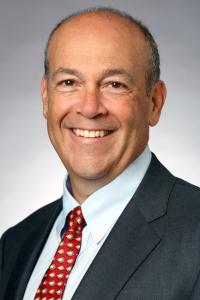Spotlight on Joshua E. Hyman, MD
Weinberg Family Cerebral Palsy Center Provider Spotlight
Joshua E. Hyman, MD, has a lifelong connection with Columbia University and the NewYork-Presbyterian Morgan Stanley Children's Hospital where he practices. He is the Clinical Director of the Weinberg Family Cerebral Palsy Center (WFCPC) and Professor of Orthopedic Surgery at Columbia University Irving Medical Center. A nationally recognized pediatric orthopedic surgeon, Dr. Hyman has dedicated his career to improving the lives of children and adults with cerebral palsy. In this spotlight, Dr. Hyman shares his history with the institution, his love for literature, and a glimpse into his life outside the hospital.
Q1) Dr. Hyman, you have a long history with Columbia University and the NewYork-Presbyterian Morgan Stanley Children's Hospital. Can you share that history with us?
Yes, I was actually born here! Back then it was called the Babies Hospital. I maintained a relationship with the hospital through my father who worked here as a pediatric anesthesiologist and intensive care doctor for his entire career.
I then came back to attend Columbia College. Then I was in graduate school at Columbia for English Literature. I also went to medical school here for four years. After medical school, I left for about 10 years to do my orthopedics and pediatric orthopedics training in Boston and Toronto. I returned to Columbia as faculty in 2000.
Q2) You went to graduate school for English Literature. Did you want to be a writer?
I wanted to be a reader. I enjoy reading literature. I like the wonderful ideas and the way ideas are presented as literature.
Q3) How does reading literature help you with being a doctor?
That's a good question. It gives me a broader perspective. Literature is often about human experience, and much of the human experience centers around our physical health. Medicine, literature and society are actually closely linked. There's a whole discipline of narrative medicine which is learning about medical conditions through literature, and that’s fascinating. My experience with literature has helped to enrich my understanding of medicine.
Q4) What are you reading right now?
A novel about the Spanish Civil War. Its my break from medicine!
Q5) You have traveled to many places around the world, including Haiti and China. What brought you to those places?
China was my first exposure to global health. Since medical school, I’ve always wanted to expand my field of care, from here in the New York area to other parts of the world where it was equally needed, but much less available.
Back when I was in medical school, and during my training in the nineties, there weren’t many opportunities for medical students and residents to get involved in global health. When I returned here to work, my senior partner Dr. David Roye was going to China with an organization that he helped found and was very generous in inviting me along. And I wound up participating with the organization for 18 years. During that time, we traveled for medical missions in China once or twice a year.
Q6) You also have another special connection with China.
Yes, I had a connection with China even before I was involved with these medical missions. I have two children who are adopted from China. In fact, my first trip to China was to pick up my first daughter, Zoe. That was 24 years ago. Zoe was born in 2001, and we adopted her at eight months olds. And then my other child, Charlotte was born in 2006, and we adopted her in 2008. She’s now a sophomore in college.
Q7) Tell us about your travels to Haiti.
My first time in Haiti was right after the earthquake in 2010. I remember driving across the George Washington Bridge on my way to work, listening to the news on how the horrific situation there was unfolding. And I thought, there's got to be something that I can do. So, I reached out to a medical journalist friend who I knew was heading down to Haiti.
She connected me to this organization, Project Medishare, who said they needed medical help immediately. I packed my bags and landed in Porto Prince three days after the earthquake, then stayed for two weeks. I developed a relationship with this organization and went back to Haiti many times till 2020. COVID and the situation in Haiti eventually made it more challenging to go, and sometimes even to leave.
Q8) It’s great to hear about your adventures. You love getting outdoors, especially to ski. Tell us about the adaptive ski trip you run for the WFCPC each year.
I’ve been skiing since I was 14, and my family take a ski trip together each year. Skiing is a great activity. One of my interests in neuromuscular care is getting kids to participate in activities they might enjoy. Skiing may seem like something so far out of their reach, but it really isn't. There are magnificent adaptive ski programs at many mountains now with sit-ski and stand-ski options. We took our first adaptive ski trip with the WFCPC families six years ago and now go every year. Both the kids and adults who go love it. The parents love it. Our staff love the time together too. Overall, it's a great day out for everyone.

